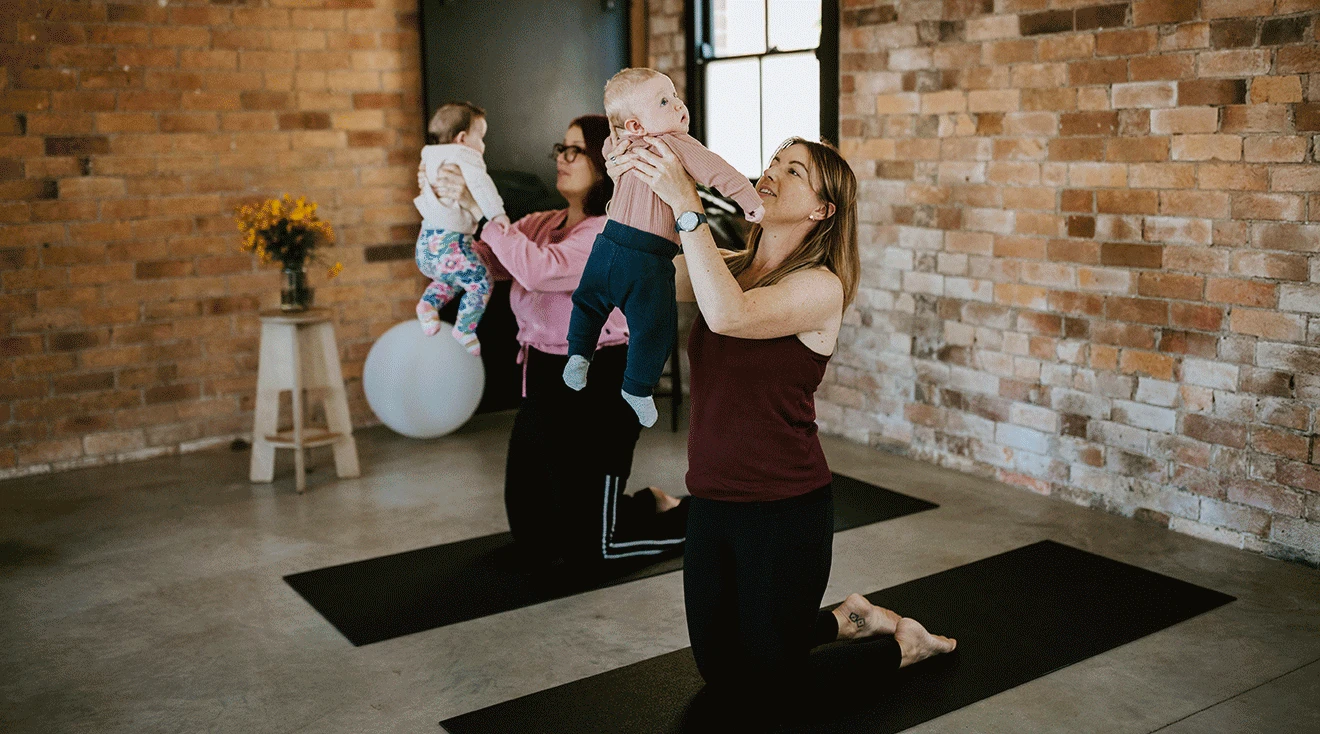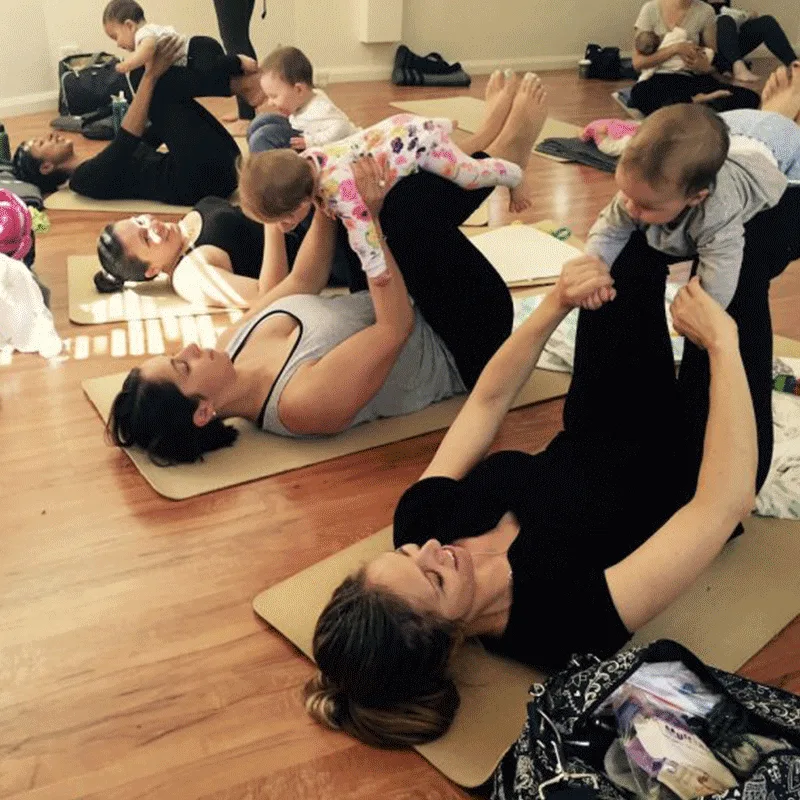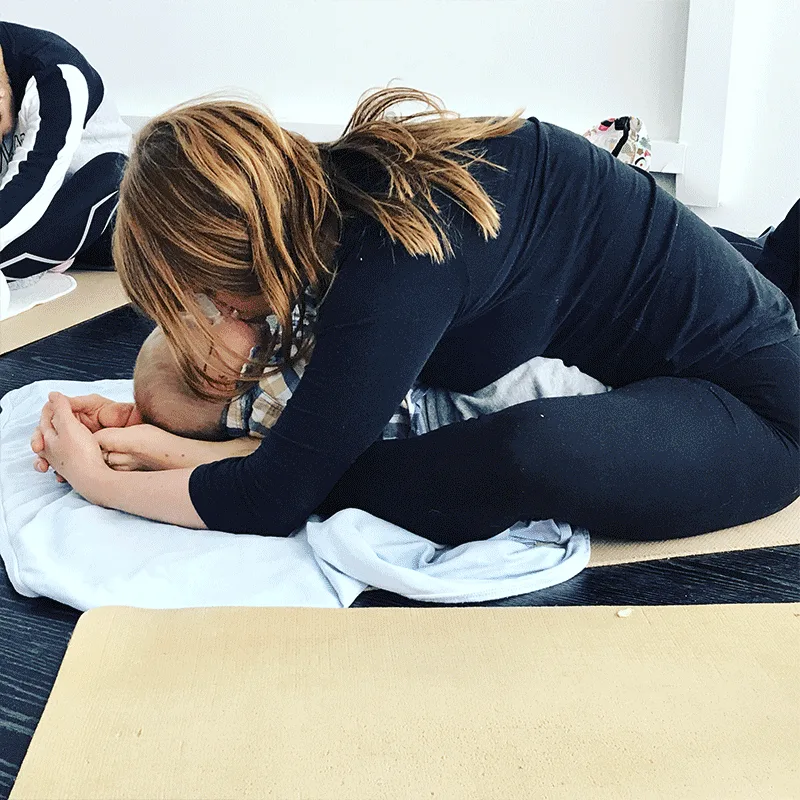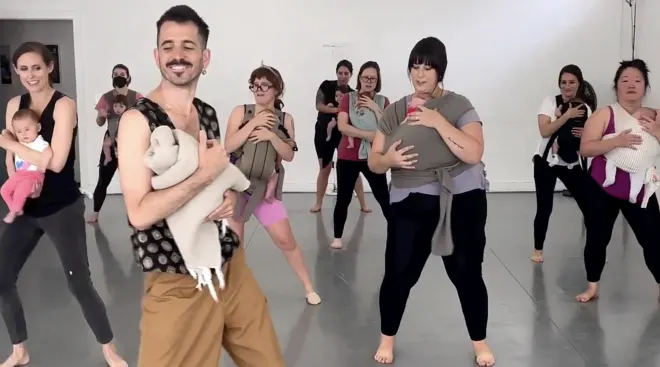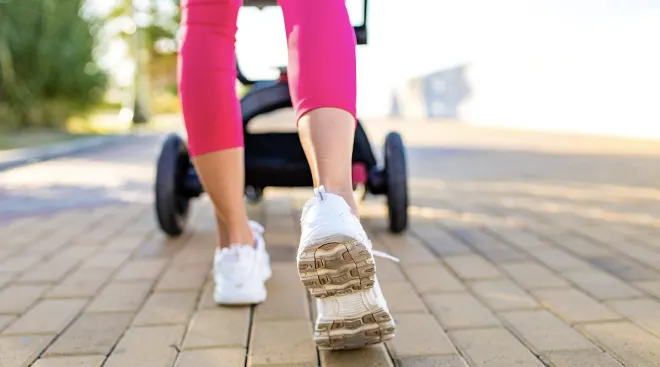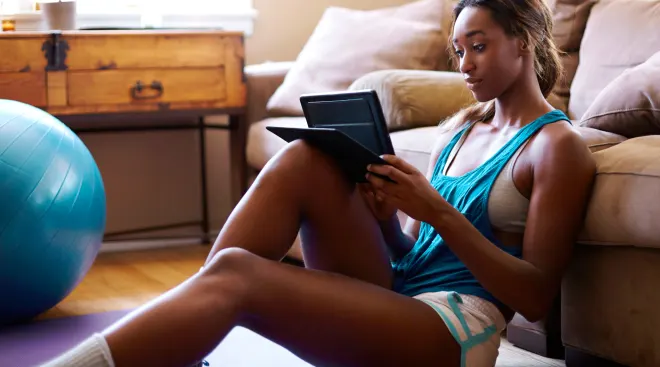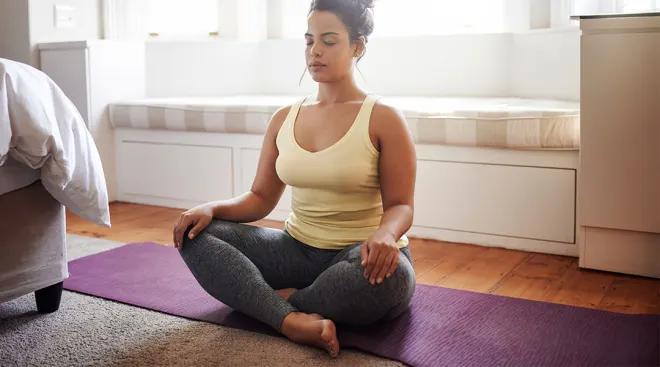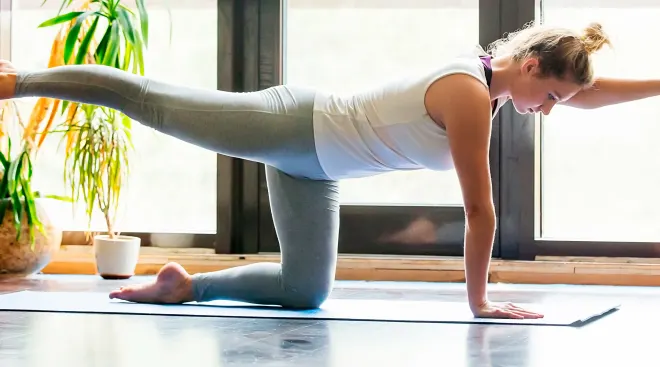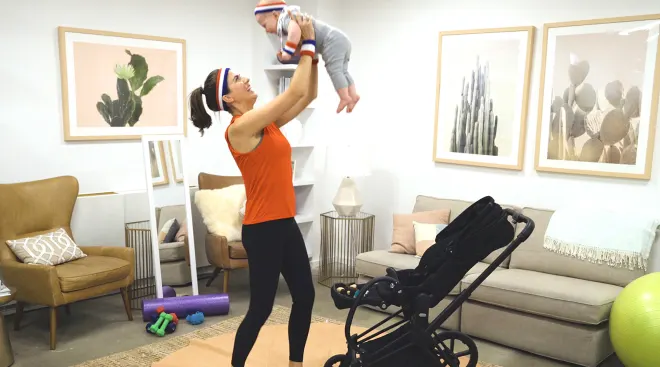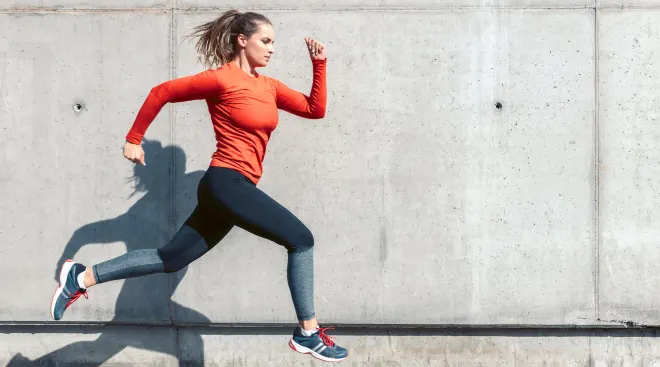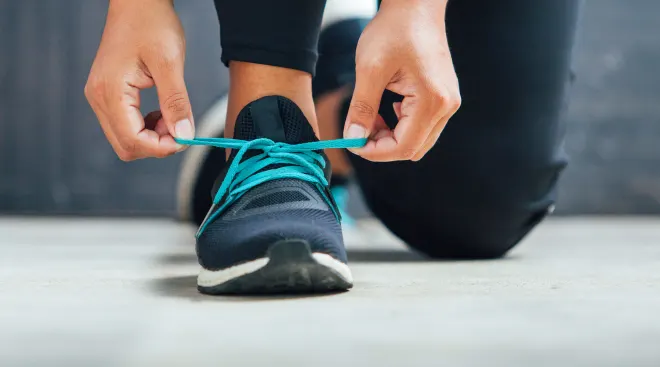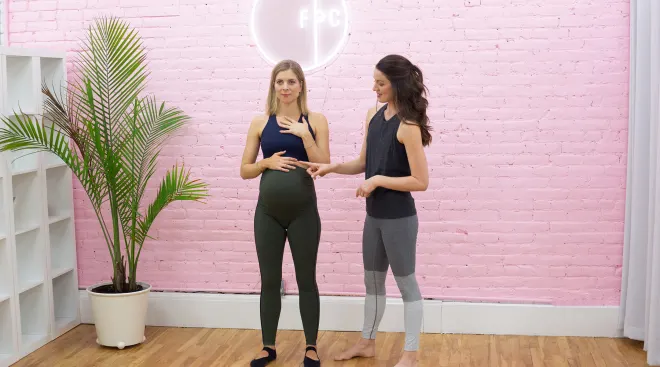The Benefits of Baby Yoga
Looking for a low-maintenance activity to do with baby that offers physical, mental and emotional benefits—and chills baby out? Baby yoga could be the answer. “Babies are natural yogis,” says Patti Ideran, OTR/L, CEIM, a pediatric occupational therapist at Northwestern Medicine Central DuPage Hospital. “They live in the moment, which is what yoga is about. They also do natural yoga positions and postures in their developmental path.” So how can you harness baby’s natural gifts to create an experience that benefits you and your little one? Mommy-and-me yoga, of course.
We consulted with experts and instructors to explore everything you need to know about baby yoga, poses to try together at home, safety tips and more.
The origins of baby yoga aren’t entirely clear, but it has connections to baby massage, which was popularized in the West by Vimala McClure, founder of the International Association of Infant Massage. In 2004, Helen Garabedian, a yoga and infant massage instructor, helped bring baby yoga to the mainstream when she published Itsy Bitsy Yoga, which outlines over 70 baby yoga poses for parents to try with baby.
“Baby yoga utilizes similar movement patterns that you’d find in a restorative or gentle yoga class for adults,” notes Claire Koepke, a New York-based pre and postnatal yoga instructor and doula. “The main difference is that we’re simplifying the movements, assisting the stretches and guiding baby through a sensory, playful experience.”
Baby yoga is different from a typical postpartum yoga class—where baby might hang out next to you in a stroller or bassinet—because your little one is actively involved in poses, says Nadine O’Mara, a senior yoga teacher, birth doula and director of Bliss Baby Yoga. “Mothers often enjoy the opportunity to include baby in the yoga and to feel baby is benefiting too,” she says. “What’s more, when babies are included, they’ll often be content for far longer than if they’re left to watch by the side.”
Even though it’s often referred to as “mommy-and-me yoga,” baby yoga isn’t just for postpartum moms—all parents and caregivers are encouraged to bond with baby through the poses. Classes provide an opportunity for movement, song and even baby massage—all key for parent-baby bonding and baby’s development, says O’Mara.
Baby yoga provides plenty of benefits for baby and their parent or caregiver. Let’s delve into some of them.
Benefits for baby
Baby yoga is a triple threat—providing physical, emotional and social benefits for baby. Here are some important ones, according to experts:
- Physical development. Ideran notes that babies often spend a lot of time in bouncers, strollers and baby seats, which can hinder physical development. “Baby yoga gets them on the floor to develop all the muscles and sensory experiences necessary for enhanced physical development,” she explains. For example, being on their backs helps babies work on flexion against gravity, and time spent on their tummies builds tolerance for this position, and helps with “strength, weight-bearing and beginning patterns of mobility,” she says.
- Emotional regulation. "Babies hold tension in their bodies, just like us!” says Koepke. “Yoga is a great way to help them stretch, relax and feel more at ease in their rapidly growing body.” She adds: “When we create a sensory-rich experience by engaging babies through sound, touch, sight and bilateral coordination—using both sides of the body simultaneously—we are encouraging the development of executive function, emotional regulation and mind-body awareness.”
- Bonding and communication. “Parents who are doing yoga with their babies are giving their attention to baby in a positive way, most likely playfully smiling and speaking ‘babyese’ while changing positions,” says Cynthia DeTata, MD, an ob-gyn and clinical assistant professor in maternal-fetal medicine at Stanford Medicine. “We know this type of interaction is tremendously beneficial to the parent-baby pair for bonding, stress reduction and learning how to communicate with each other non-verbally.”
- Decreased fussiness and better sleep. “Many modern toys for babies have added lights and sounds that can be overstimulating to babies,” notes DeTata. “Yoga allows for more calm movements.” Ideran notes that during “relaxation time” at the end of class, she’s observed several babies—and even parents—falling asleep.
Benefits for partners in practice
Baby yoga also offers a host of advantages for parents and caregivers who practice poses with their little ones:
- Bonding and communication. Yes, this is a benefit for both baby and parent! Ideran says baby yoga offers connection through play, touch and movement. “Baby yoga helps parents learn about their babies’ cues, what they like and what they don’t like,” she says. “It helps you be in the moment with baby and gives the gift of undivided attention.” Parents also gain more confidence handling their babies and realize that they’re not as fragile as they thought.
- Postpartum recovery. O’Mara says that baby yoga can help postpartum parents rebuild strength, tone and stability lost during pregnancy and childbirth. A review published in The Journal of Obstetrics and Gynecology of India suggests that low-intensity yoga postures can strengthen the abdominal wall and pelvic muscles, improve blood flow and enhance balance.
- Stress reduction. “Practicing yoga can decrease cortisol, which may be particularly helpful when recovering from a difficult or traumatic delivery,” says DeTata. “Yoga can offer ways to cope as a new mother, such as better connection with the breath,” says O’Mara, adding that restorative yoga poses can “offer deep rest and support exhausted nervous systems.”
- Community and support. Baby-and-me yoga classes provide an opportunity to connect with other parents and babies, which can help foster a supportive community of friends.
With all the benefits baby yoga provides, you’re likely eager to get started. But both O’Mara and Koepke recommend waiting until baby is at least 6 weeks old. “Before this, [they’re] still in a state not too far from in utero, and baby yoga classes can provide too much stimulation,” O’Mara says. “When their waking periods begin to lengthen to [beyond] 45 minutes, on average, is a good time to start.”
Whenever you begin, baby should be able to safely raise their head whilst on their stomach, says DeTata. Koepke adds that baby should be checked for hip dysplasia before being cleared to start baby yoga. When it comes to postpartum parents, the American College of Obstetricians and Gynecologists (ACOG) notes that those who had a normal vaginal delivery may be able to start light exercise a few days after birth. and those who had a c-section should wait until they get medical clearance. Of course, you should always check in with your provider before starting a new exercise routine after birth.
Once your OB and pediatrician have given you the green light, it’s time to sign up for baby yoga! There are classes hosted across the country, from hospitals and universities to community centers, parent co-ops and yoga studios. O’Mara says it’s important to make sure instructors have postnatal yoga-teacher training that also covers baby.
Class structure can vary widely, but O’Mara says she typically starts with parents and babies seated on the floor, then moves on to standing poses and ends with resting poses—just like in many adult yoga classes. “Classes can be very ‘organic’ in flow depending on the babies,” she says. “It often works to place the babies together in the middle of the room at the end where I can ‘entertain’ them to allow the moms time to rest in restorative yoga poses.”
If you can’t find an in-person class near you, or just want to practice at home, there are lots of online and virtual classes.
Ready to get started? Try out these favorite baby yoga poses from our experts:
Alternating arm “hugs”
Sit on the floor and place baby on their back in front of you, says Koepke. Take their hands, open their arms wide to the sides and then cross them, as if they’re giving themselves a hug. Pair each movement with a word. For example: Open arms “You’re,” cross arms “So,” open arms “Big!” Repeat a few times, switching which arm’s on top.
Cross-body “crunch”
With baby on their back, hold their left hand and wrap your right hand securely over their right ankle, says Koepke. Draw their left hand toward their right knee, bending the knee and tap three times (singing “tap tap tap”). Then stretch out their limbs again. (You can sing, “Streeetch!”) Repeat five to 10 times and then switch to the other side.
Baby squat-and-twist
With baby on their back, hold their ankles and gently bend their knees toward their belly, says Koepke. Next, straighten their legs to give them a nice stretch. Repeat a few times. Then, when knees are in a squat position, you can gently guide their legs to one side, twisting their lower body. Pause there, encouraging them to turn their head and torso in the same direction on their own (no worries if they don’t). Slowly return their legs to the center and twist to the other side, pausing to see if they’ll turn their head to follow. Repeat three to five times on each side.
Airplane baby
Also called “Super Baby,” this one’s intended for older, stronger babies, says Ideran. In this pose, you lie on your back with legs bent and knees to chest. Then, gently place baby belly-down on your shins and hold them firmly, gently moving up and down. (Watch out for spit-up and drool!)
Zoom to the moon
Begin in a seated position, holding baby facing you with your hands under their armpits, says O’Mara. Slowly lift baby out in front of your face with a slight bend in your elbows while saying, “Zoom, Zoom, Zoom…We’re going to the moon, moon, moon.” Countdown “3, 2, 1” and on “lift-off,” raise baby slightly above your head before lowering them back down.
Roll with me baby
Lie on your back and place baby on your chest, says Ideran. Hold them securely as you gently roll from side to side.
Seated forward bend (Paschimottanasana with bent knees)
Sit with your legs straight out in front of you, with a little bend in your knees. Lay baby down on their back between your legs with their head supported by your feet. Bend at your lower back, reaching for your toes, bringing your head as close to baby’s as comfortable for some face-to-face bonding, notes O’Mara.
A round of applause
Starting with baby on their back, hold their ankles and tap their feet together while making a big circle with their legs, says Koepke. Feel free to say, “Yay! A round of applause for baby yoga!”
There are important tips to keep in mind when starting baby yoga for your little one’s safety and well-being. Here are the important ones to keep top of mind:
- Practice on a soft surface. “[Baby’s] head is much bigger and heavier proportionately to the rest of the body, making them more likely to tip over,” cautions DeTata.
- Make sure baby doesn’t have hip dysplasia. Again, it’s important to get baby checked out for this common and treatable condition before starting baby yoga, says Koepke.
- Wait after eating. If baby’s prone to spitting up, Koepke recommends waiting at least 20 to 30 minutes after feeding them before starting a baby yoga class. This will help prevent spit up—and will hopefully make baby more comfortable while learning something new! “Lay down a burp cloth just in case!” she advises.
- Pay attention to baby’s cues. “We always say ‘babies rule’ during class,” says Ideran. "We meet the baby where they are. If they don’t have head control yet, we support their head, slow down the movement, hold them closer with more support and do fewer repetitions.”
- Embrace baby’s needs. “Babies cry! It’s one way they communicate with us,” says Koepke. She encourages parents to respond to baby’s needs during class, whether it’s feeding or soothing. “Baby yoga is much more relaxed than an adult yoga class, and everyone in the room understands the flexibility needed in a room full of infants!”
- Keep things gentle. “You may have noticed that baby is very flexible compared to an adult,” says DeTata. “This might make them prone to injury from overstretching.” To prevent this, Koepke advises parents to avoid pushing baby beyond their natural range of motion. “Gentle is best, and if baby isn’t feeling it, don’t force it,” she says.
- Mind your own body. “Your body has gone through tremendous changes throughout the course of your pregnancy and delivery,” DeTata says. Make sure to be aware of your center of gravity and avoid poses that add strain to your already stretched core and pelvic floor muscles, she advises.
Whether you’re practicing in a class or at home, embracing flexibility—in every sense of the word—and responding to baby’s cues will enrich your experience. The beauty of baby yoga lies in the opportunity to strengthen the bond between you and your little one while promoting physical development and relaxation. Go with the flow, cherish the shared moments and enjoy the journey of discovery and connection with your little yogi.
Please note: The Bump and the materials and information it contains are not intended to, and do not constitute, medical or other health advice or diagnosis and should not be used as such. You should always consult with a qualified physician or health professional about your specific circumstances.
Plus, more from The Bump:
Cynthia DeTata, MD, is an ob-gyn at Stanford Medicine Children’s Health and clinical assistant professor in maternal-fetal Medicine at Stanford Medicine. She earned her medical degree from the University of Southern California Keck School of Medicine.
Patti Ideran, OTR/L, CEIM, is a pediatric occupational therapist at Northwestern Medicine Central DuPage Hospital. She’s also a certified educator of infant massage and a certified instructor of baby and toddler yoga.
Claire Koepke is a New York-based pre and postnatal yoga instructor and doula.
Nadine O’Mara is a senior yoga teacher, birth doula and director of Bliss Baby Yoga, specializing in online prenatal and postnatal yoga teacher training.
International Association of Infant Massage, Canada, Founder of IAIM, Vimala McClure
The Journal of Obstetrics and Gynecology of India, Physical Activity, Yoga, and Exercise Prescription for Postpartum and Midlife Weight Management: A Practical Review for Clinicians, March 2022
American College of Obstetricians and Gynecologists, Exercise After Pregnancy, August 2022
ResearchGate, Returning to Running Postnatal – Guidelines for Medical, Health and Fitness Professionals Managing This Population, March 2019
Learn how we ensure the accuracy of our content through our editorial and medical review process.
Navigate forward to interact with the calendar and select a date. Press the question mark key to get the keyboard shortcuts for changing dates.
Advertisement
Advertisement
Advertisement
Advertisement
Advertisement
Advertisement
Advertisement
Advertisement

































